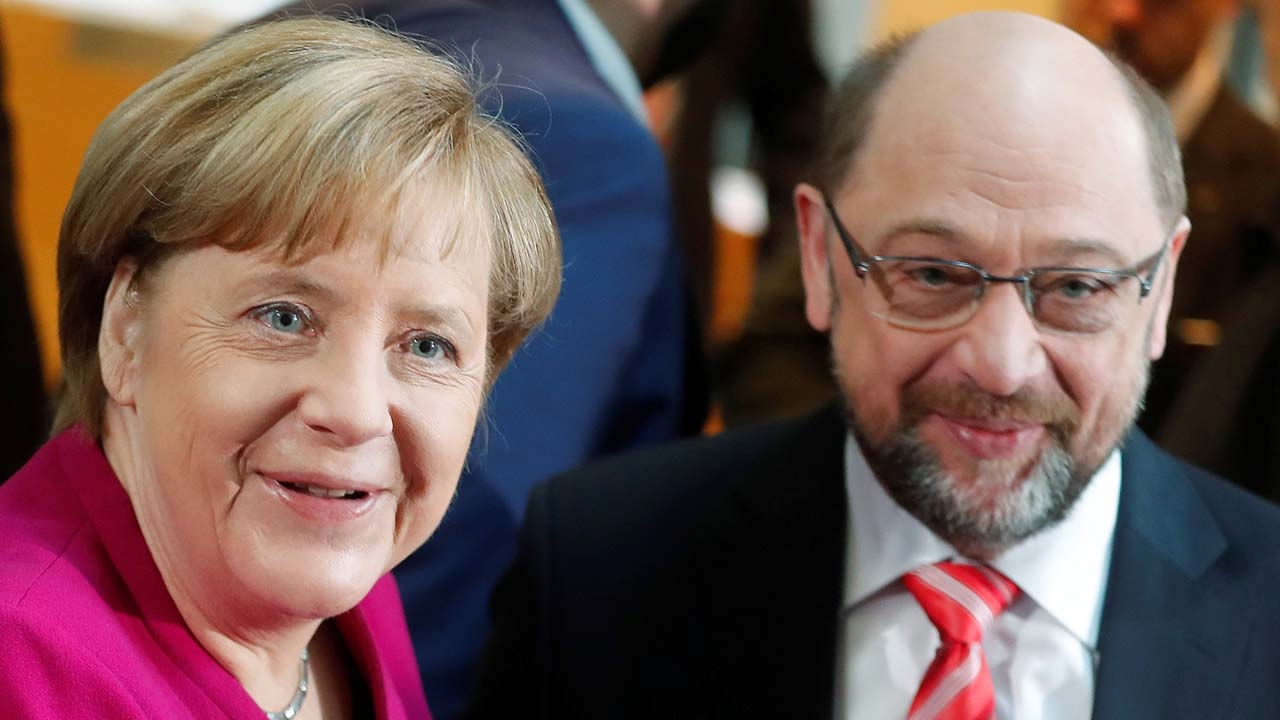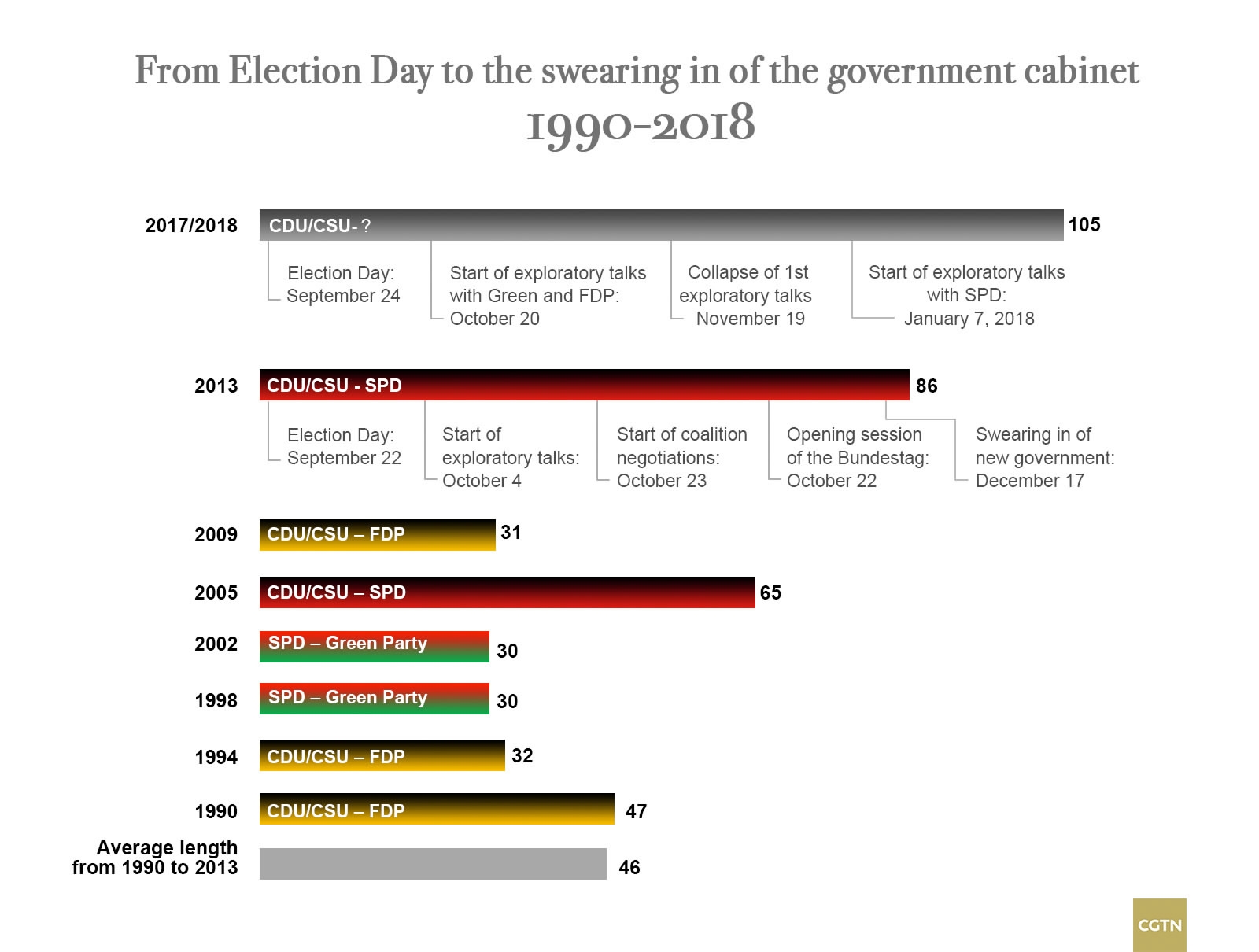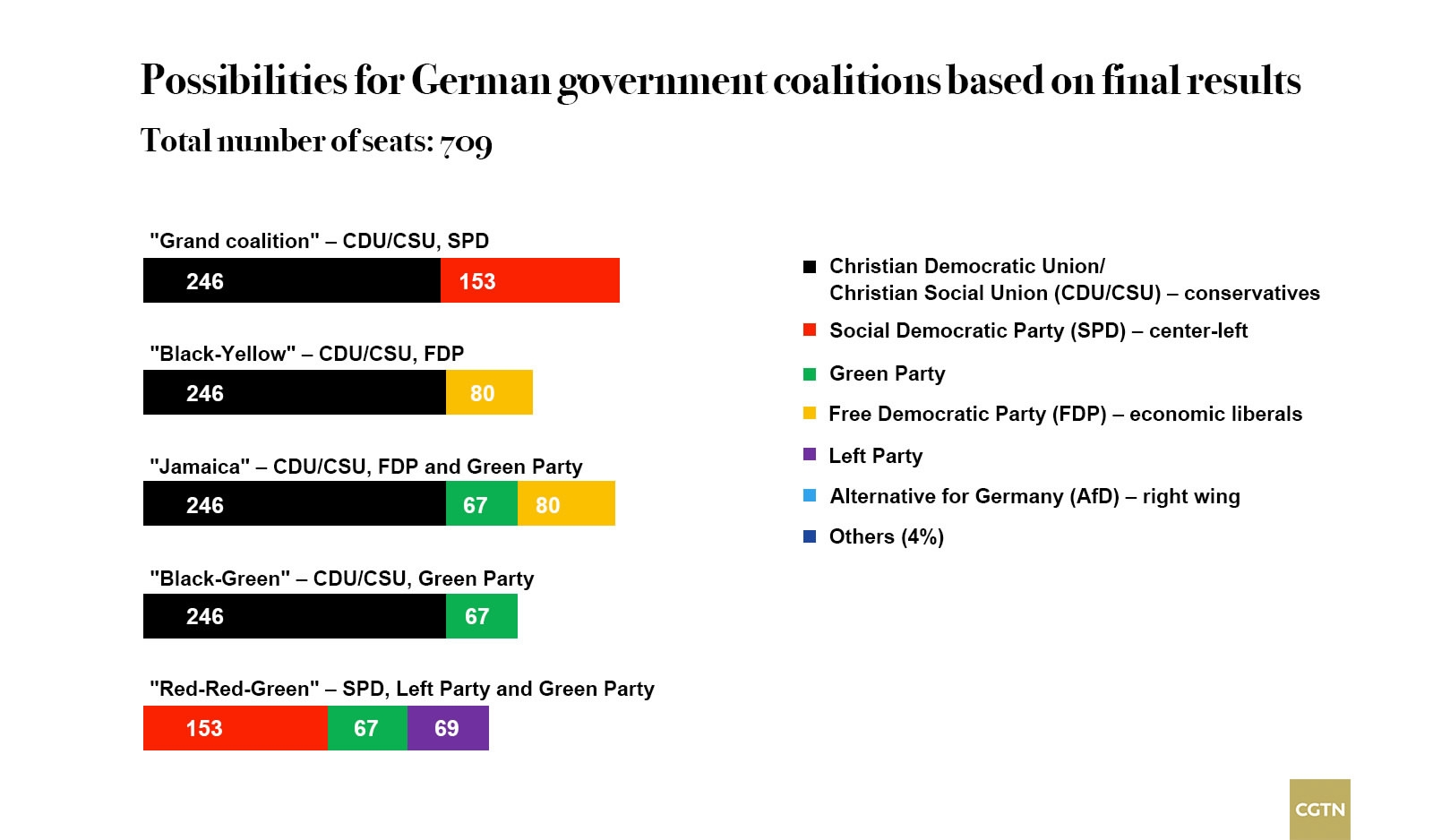German Chancellor Angela Merkel's second bid to forge a coalition government starts on Sunday, when the conservative alliance (CDU/CSU) sits down with the Social Democratic Party (SPD) for five days of exploratory talks.
"There is a lot of work ahead of us in forming a coalition but I am optimistic," Merkel said ahead of Sunday's talk, adding that she is confident in forming a coalition.
But the German public shows more reservations: According to a poll recently conducted by DW, the greater majority – about 52 percent of the public – refused to give an opinion about forming a coalition government, showing a tiring attitude towards the long-term unsettled issue.
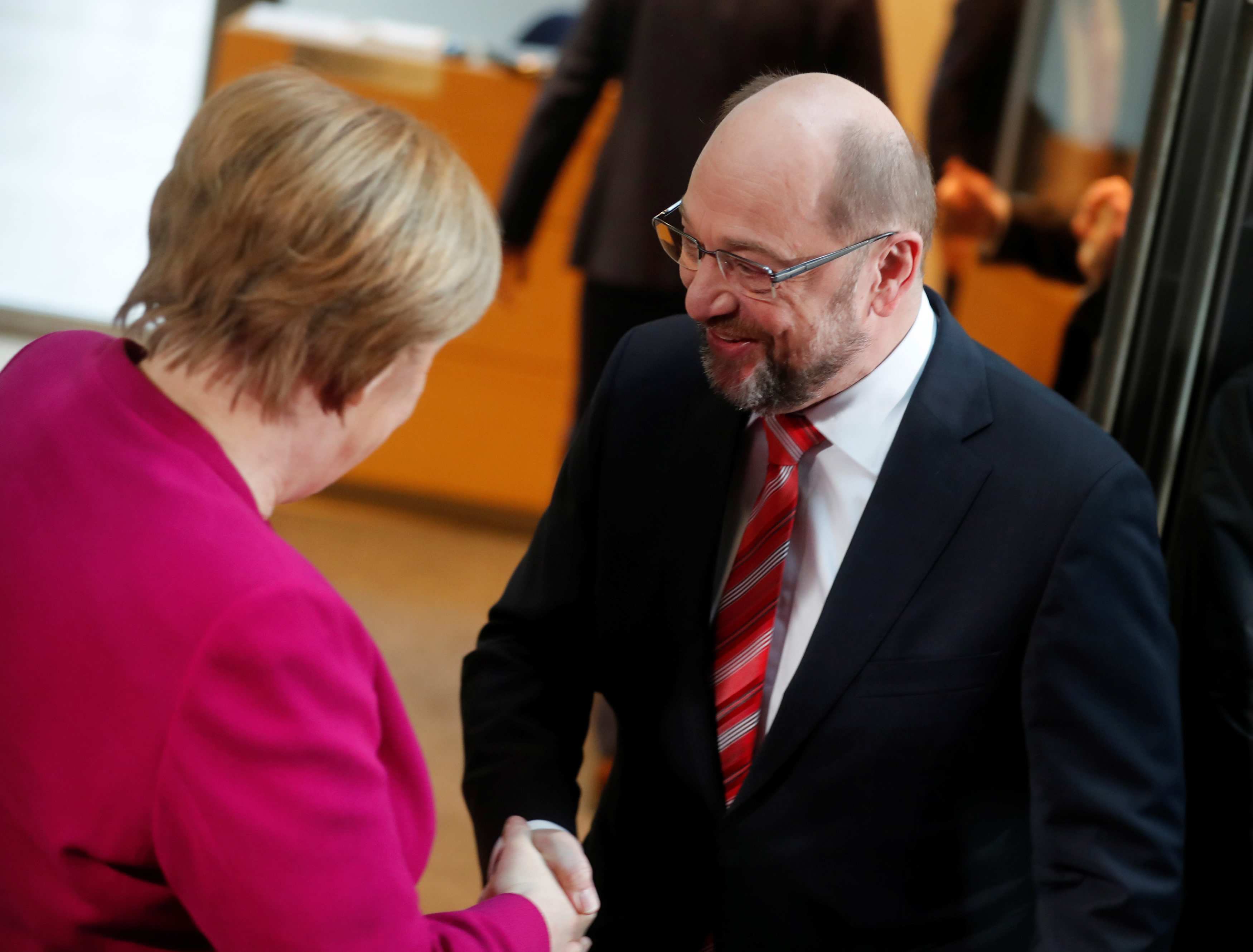
Leader of the Christian Democratic Union (CDU) and the acting German Chancellor Angela Merkel and Social Democratic Party (SPD) leader Martin Schulz shakes hands before exploratory talks about forming a new coalition government at the SPD headquarters in Berlin, Germany, January 7, 2018. /Reuters Photo
Leader of the Christian Democratic Union (CDU) and the acting German Chancellor Angela Merkel and Social Democratic Party (SPD) leader Martin Schulz shakes hands before exploratory talks about forming a new coalition government at the SPD headquarters in Berlin, Germany, January 7, 2018. /Reuters Photo
Merkel's predicament
More than three months after Germany's 2017 general elections, Merkel is still in predicament. Germany now faces its longest interim period between the end of election and form of a new government since 1949. As the new round of exploratory talks is due on Sunday, it is still unclear whether German politicians can break the deadlock.
Merkel's first attempt – the coalition talks between conservatives, the Free Democratic Party (FDP) and the Greens – which aimed to form a so-called Jamaica alliance, failed in November, after the FDP quit negotiations due to the party's belief that the four parties could barely find any common ground.
The best option for Merkel appears to be a re-run of the "grand coalition" with the SPD.
The SPD, who played junior partner in the German government for the past four years, at first refused any coalition talks with Merkel, citing two partnerships with the conservatives in 2005-2009 and 2013-2017 as leading to a punishment at the voting booth this September, in which the party embraced its worst election result since 1933.
But Germany’s president, Frank-Walter Steinmeier, a fellow Social Democrat, appealed to Martin Schulz, the leader of SPD to reconsider coalition, in order to end the political drama of the country.
“We are now facing a situation that has never happened before in the history of the Federal Republic of Germany, that is for almost 70 years,” President Frank-Walter Steinmeier said.
On Dec. 7, the SPD voted at its party conference, passing a resolution to allow the beginning of talks with the beleaguered Merkel about forming a new coalition. It also provides a glimmer of hope that a solution to the political paralysis may be found.
‘The world will not wait’ vs 'EU is waiting'
In Merkel’s New Year address, she warned that “the world will not wait” for a new German government, while leaving out how Europe was waiting increasingly impatiently.
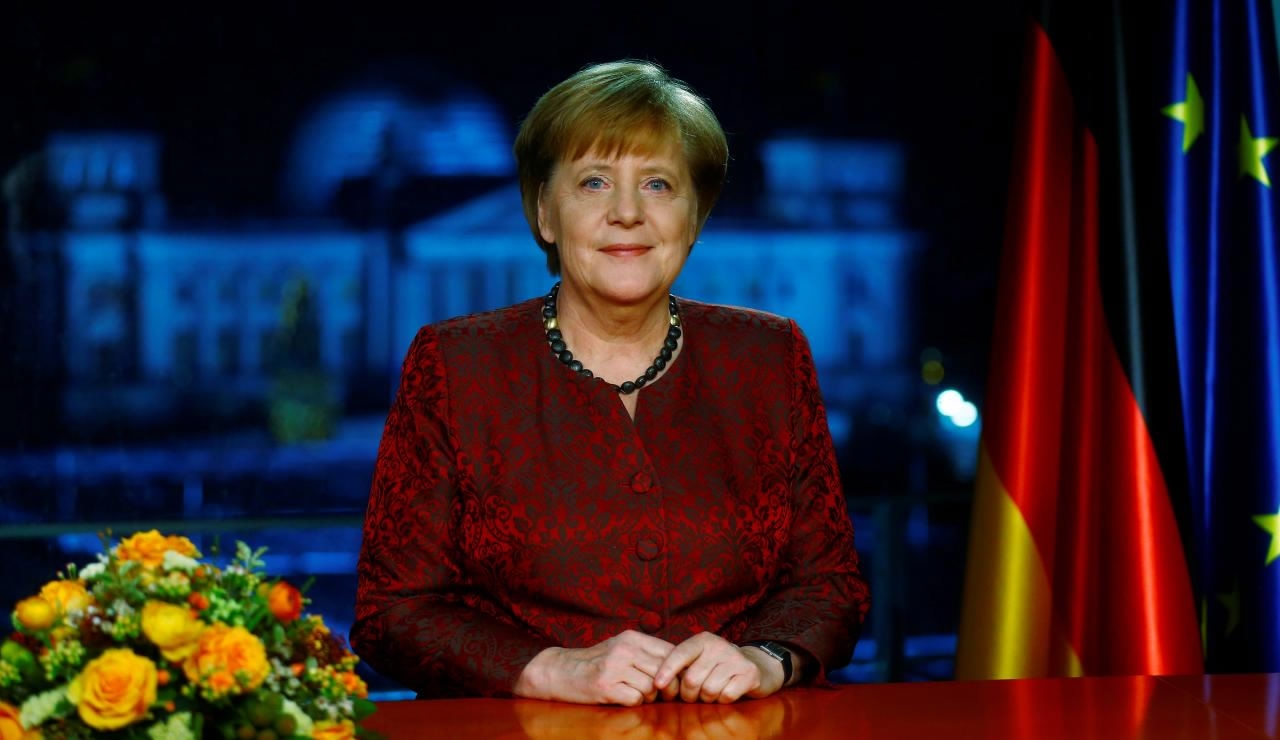
German acting Chancellor Angela Merkel poses for a photo after the television recording of her annual New Year's speech at the Chancellery in Berlin, Germany, December 30, 2017. /Reuters Photo
German acting Chancellor Angela Merkel poses for a photo after the television recording of her annual New Year's speech at the Chancellery in Berlin, Germany, December 30, 2017. /Reuters Photo
Last September, French President Emmanuel Macron unveiled an ambitious new vision for the EU which included fiscal reforms to strengthen the Eurozone and hoped the idea could be sold to voters in the 2019 election campaign for the European Parliament.
Macron and the EU have been waiting in vain for the German response ever since.
“A sense of urgency wouldn’t go amiss,” said Jean-Claude Juncker, the European Commission president, last month. “Everybody knows about Germany’s influence in the EU.”
Germany did know. Volker Kauder, leader of the German conservative parliamentary group and a key Merkel ally, once said: "Europe is waiting for a Germany capable of acting so that it can finally respond to the questions raised by French President Emmanuel Macron."
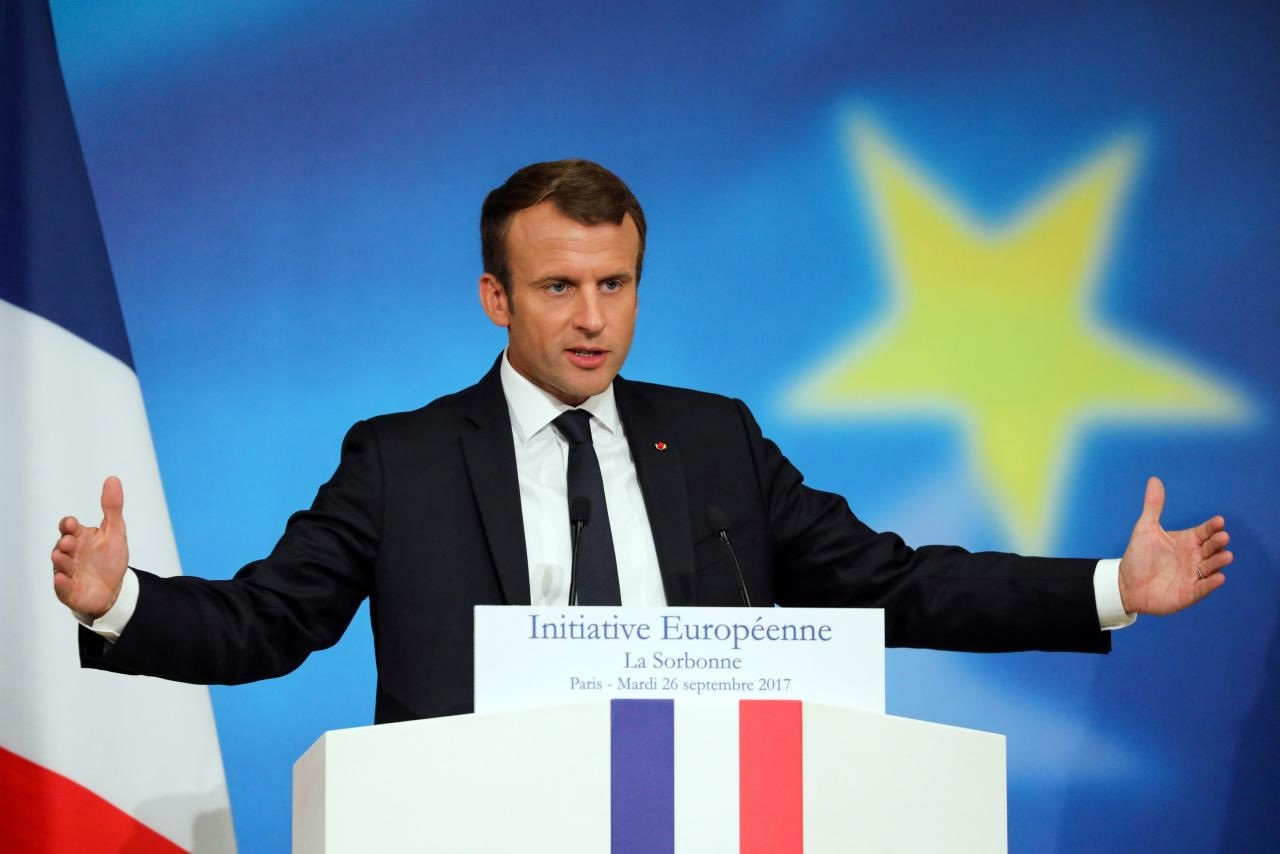
French President Emmanuel Macron delivers a speech to set out plans for reforming the European Union at the Sorbonne in Paris, France, September 26, 2017. /Reuters Photo
French President Emmanuel Macron delivers a speech to set out plans for reforming the European Union at the Sorbonne in Paris, France, September 26, 2017. /Reuters Photo
In the upcoming talks, one of Merkel’s priorities will be to create a trusting atmosphere, which is missing from her collation talks with the Greens and the FDP in November.
Schulz will have to prove to his party that the new Merkel-led government will adopt some of the SPD’s symbolic policies.
Given their mixed fortunes, standing close to Brussels may be the first consensus agreement between Merkel and Schulz.
Schulz, former European Parliament president, repeatedly claimed reviving the EU is his urgent priority. He told his comrades the reason to restart a conversation with Merkel is to realize a “United States of Europe”.
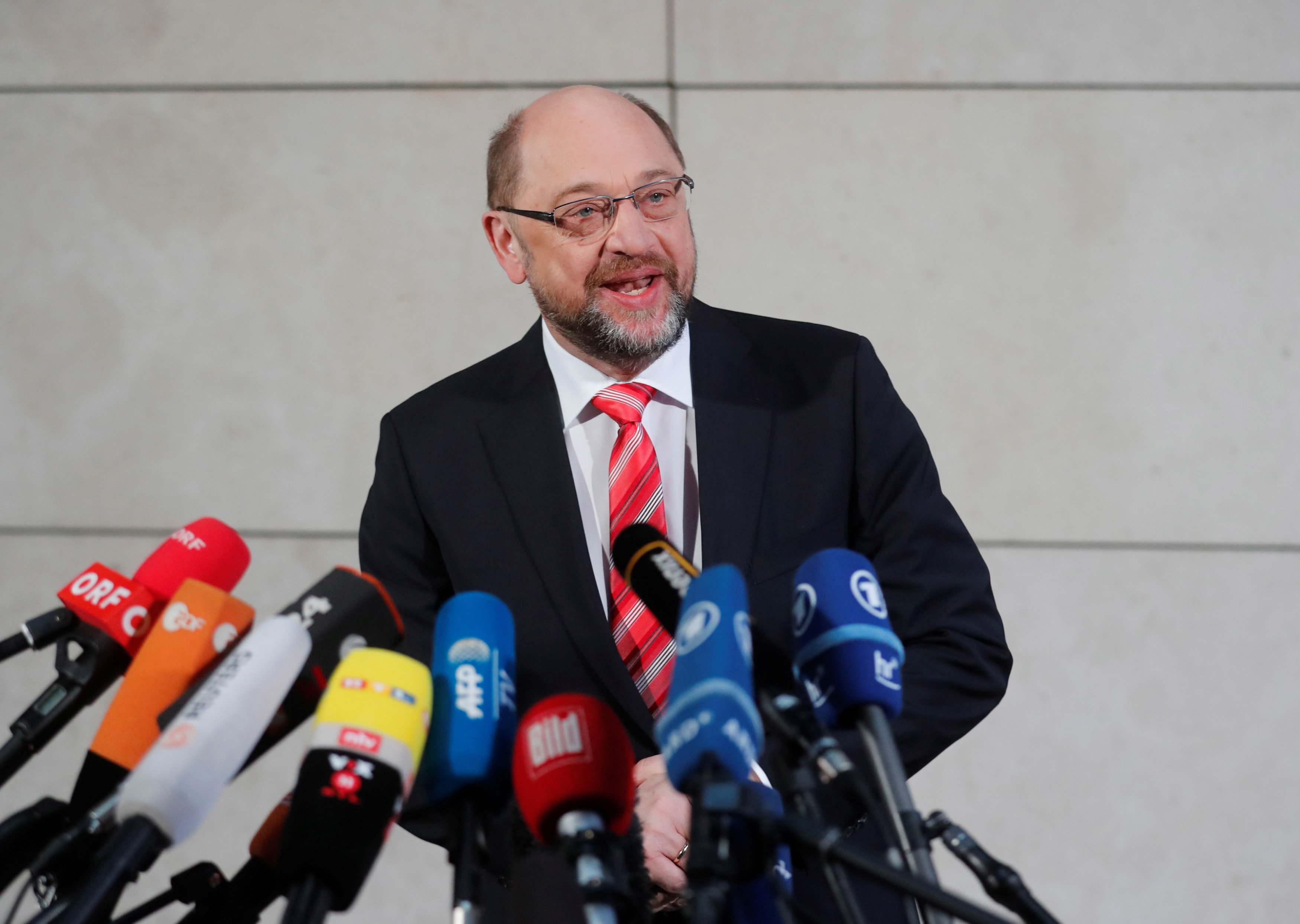
Social Democratic Party (SPD) leader Martin Schulz delivers a statement before exploratory talks about forming a new coalition government, at the SPD headquarters in Berlin, Germany, January 7, 2018. /Reuters Photo
Social Democratic Party (SPD) leader Martin Schulz delivers a statement before exploratory talks about forming a new coalition government, at the SPD headquarters in Berlin, Germany, January 7, 2018. /Reuters Photo
From Merkel’s side, experts believe sticking close to Macron will be her best survival strategy. With her French partner, she could work together to strengthen the Eurozone, boost European Defense and reform EU migration and asylum policies.
Conservative 'Mutti' vs ambitious 'Sankt Martin'
Merkel's middle-of-the-road leadership style earned her the nickname Mutti ("mom"). This means that, although she agrees with part of the young French leader’s new EU agenda, the chancellor will totally change her reserved attitude when it comes to institutional change in the Eurozone and the budget issue.
On the contrary, Schulz, who was nicknamed "Sankt Martin", and his SPD is open to Germany paying more into the EU. Sigmar Gabriel, the Social Democrat foreign minister recently suggested the German government should not "work out its European policy on a pocket calculator".
His comments implied that the parties' differing approaches to EU reforms could still be a hurdle in talks.
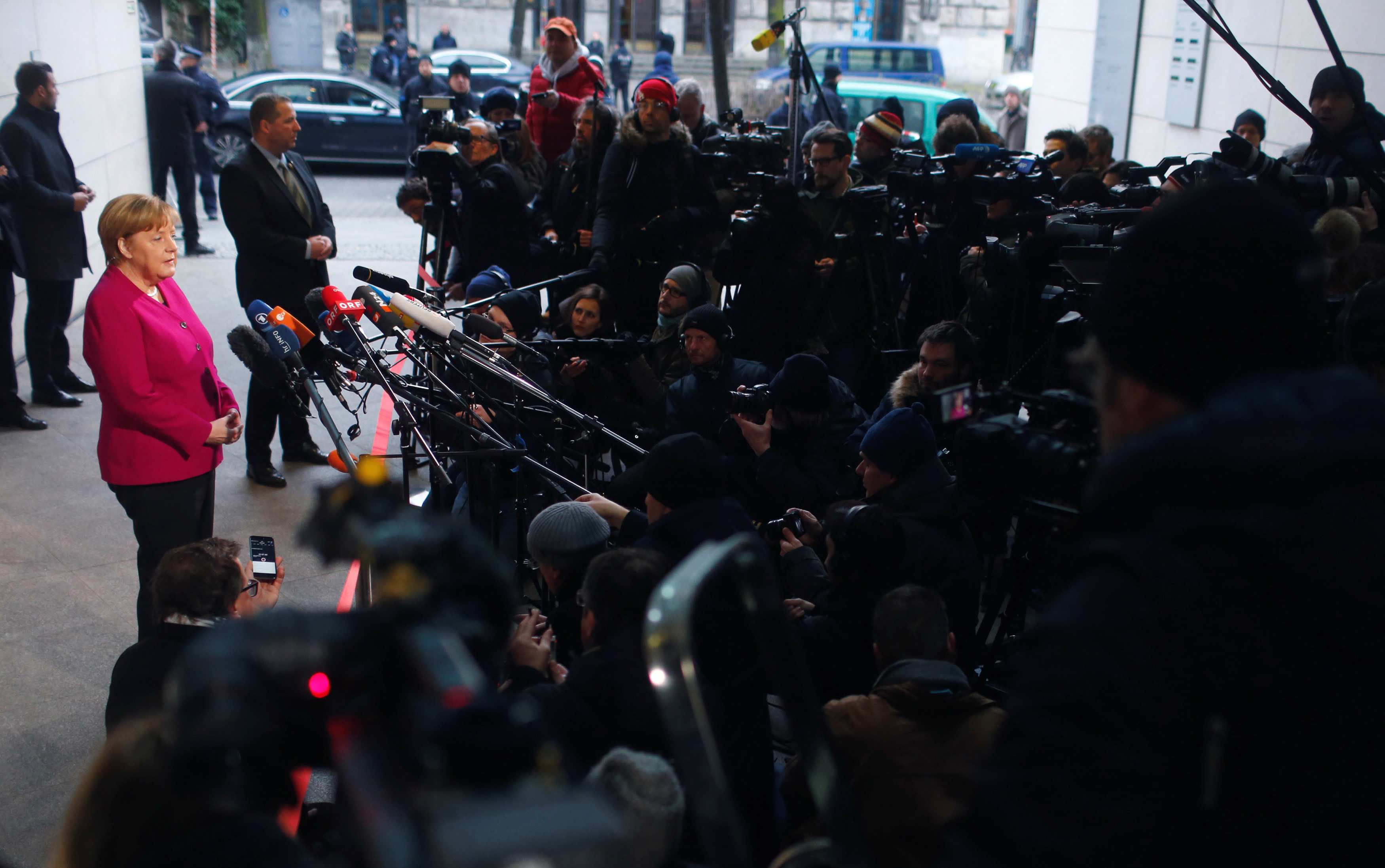
Leader of the Christian Democratic Union (CDU) and the acting German Chancellor Angela Merkel delivers a statement before exploratory talks about forming a new coalition government at the SPD headquarters in Berlin, Germany, January 7, 2018. /Reuters Photo
Leader of the Christian Democratic Union (CDU) and the acting German Chancellor Angela Merkel delivers a statement before exploratory talks about forming a new coalition government at the SPD headquarters in Berlin, Germany, January 7, 2018. /Reuters Photo
Meanwhile the “grand coalition” is at odds on issues ranging from refugee family reunification and tax to defense spending, pensions and healthcare.
Some conservatives, especially from Merkel's Bavarian sister party (CSU), have recently stirred up trouble by calling for tax cuts for high earners and reductions in benefits for asylum seekers, which the SPD strongly opposes.
Meanwhile, the CSU has also proposed increasing Germany's defense spending, widening policy gap with the SPD.
Refugee family reunification is also a major sticking point for the preliminary coalition talks. The SPD is in favor of family reunifications, while the CDU and CSU take a tighter stance.
If no deals are done in these aspects, the German Mutti’s future will still be under question.
Hopeful vs skeptical
In the joint statement which followed a meeting on Wednesday, the parties said hopefully: "Confidence has risen and we are making an optimistic start."
Nevertheless, many within the SPD still fear sharing power with Merkel again will punish their voters even further. They prefer a looser cooperation agreement or support a minority government.
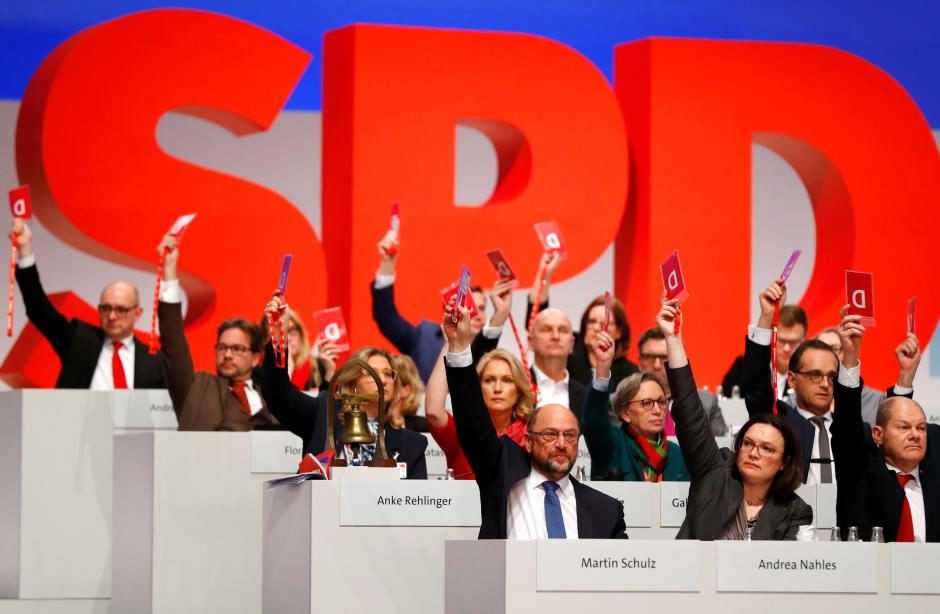
Social Democratic Party (SPD) members vote during an SPD party convention in Berlin, Germany, December 7, 2017. /Reuters Photo
Social Democratic Party (SPD) members vote during an SPD party convention in Berlin, Germany, December 7, 2017. /Reuters Photo
Facing such a skeptical party base, and even with this first exploratory step, the fate of moving forward to detailed official coalition talks is still on the side of SPD members. Schulz said he will let members vote on this decision on Jan. 21.
If the official coalition negotiations could bridge the divides between parties, Merkel would be able to start her fourth term in office within weeks. However, commentators expect the EU will have to wait until Easter, when a new German government will be installed.
If the talks go badly, this would leave options for an unprecedented minority government under Merkel or a whole new election. Merkel once said she would reject a minority government as an option as she believes is too unstable.
If the repeat election is held, the country may have to wait till the second half of the year for a new cabinet, which would be a bad news for the EU.

